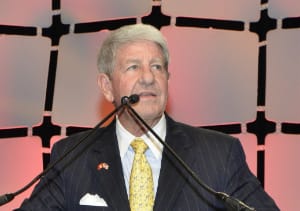
During my time as chairman of the ULI Foundation Annual Fund, my top priority has been to make the campaign more transparent by emphasizing the connections between donor giving and actionable outcomes. I want you to know why we need your support and what we’re accomplishing with the resources you provide.
The reason why the Annual Fund is so important is because 100% of contributions directly support costs related to content programs. Unlike ULI membership dues or corporate sponsorship, Annual Fund contributions from members are ONLY used to support content at ULI. And not just any content: the Annual Fund supports programs that have the ability to spark change, to drive new thinking, or, to quote our tagline, “to make a visible difference.” We are not in the business of raising money to support a single, all-encompassing work topic, but rather to support a range of discrete action-oriented projects that have the potential to spur and enliven a broad sequence of outcomes.
In 2012, we did this by:
- Supporting the ULI Greenprint Center, whose members showed a documented reduction in carbon emissions of over 8%.
- Supporting ULI’s Urban Innovation Grants program, which provided seed funding for specific land use projects in more than 20 markets around the world.
- Supporting an innovative research project measuring the relationship between housing and transportation meant to influence the future design of residential communities.
- And much more.
In 2013, our goal is to raise $1.4 million through the Annual Fund (compared with $1.3 million in 2012), which will provide funding to support programs and initiatives in three areas: Connecting and Convening, Education and Learning, and Giving Back. These programs are listed below, along with targeted funding levels to support specific activities.
Connecting and Convening
These programs are intended to bring people together for the purpose of sharing information and insight related to best practice.
New Market Opportunities within ULI’s Climate Change, Land Use, and Energy (CLUE) Initiative. Support provides funding that advances ULI’s commitment to explore new markets that allow for innovation in land use practice. Areas of interest this year include resilient communities, adaptation, and building valuation. Funds cover expenses related to original research and high-level convenings of subject-matter experts. Target funding: $100,000.
ULI Women’s Leadership Initiative. Support targets the creation of leadership opportunities for women in the real estate and land use industry. Funds provide scholarships for women to participate in ULI activities and cover the costs related to a research project designed to encourage the placement and advancement of women in the industry. Target funding: $67,500.
Regional Collaboration Efforts. Support enables activities that encourage collaboration between ULI District Councils within common regional geographies. Funding will be directed toward programs meant to address land use challenges that cross markets served by existing ULI District Councils where a regional approach is warranted. Target funding: $40,000.
Council Research. Support facilitates the creation of original research led by ULI Product Councils. The program is meant to encourage the participation of industry leaders—represented in the composition of Product Councils—in the design and execution of topical research to ensure top-level feedback regarding trends and new developments. Target funding: $100,000.
Policy Initiative. Support contributes to the creation of a formal policy initiative within ULI that tracks and monitors local national legislative developments related to real estate and land use. Specific outcomes will be used to inform areas of ULI content activity, both through established District Councils and National offices. Target funding: $32,500.
Learning and Education
These programs are intended to advance the understanding of responsible land use practice and promote the implementation of sound development decision making.
ULI Greenprint Center for Building Performance. Support enables data collection, analysis, and related interpretation for the production of the annual ULI Greenprint Center Performance Report, which measures carbon emissions, energy and water use, and waste output for commercial properties of member companies. Target funding: $50,000.
ULI Rose Center for Public Leadership. Support covers expenses related to the Rose Center’s instruction- and education-based fellowship program for mayors and select staff, providing training in land use and real estate decision making. Target funding: $50,000.
2013 Housing and Transportation Survey. Support underwrites the cost of a unique consumer-focused survey identifying key drivers of the relationship between housing and transportation, the results of which will provide for more informed design and development of residential communities and transit options. Target funding: $50,000.
Building Healthy Places. Support contributes to the launch of a major program of work centered on building healthy places. Funding will cover expenses related to convening a forum of leading land use practitioners and other key stakeholders in the fields of health and healthy communities in order to construct a dialogue around best practices and added value specific to design and development. Target funding: $50,000.
Industry Case Studies. Support covers the research for and production and distribution of a line of best practice–focused case studies on current development practice and project implementation. Target funding: $50,000.
Urban Frameworks. Support contributes to an effort to uncover similar characteristics in the makeup of urban environments around the world to understand more fully the opportunities for responsible real estate development and investment in the 21st century. Target funding: $50,000.
Capital Markets and Finance. Support provides for the examination of the trends affecting value creation in the built environment. Funding targets ULI studies and publications that demonstrate important connections between capital markets and building value. Target funding: $30,000.
ULI Visiting Fellows. Support enlivens ULI’s efforts to attract leading industry and subject-matter experts to serve as time-period visiting fellows. Funding covers expenses related to research, publication, and speaking engagements for individual fellows. Target funding: $50,000.
Giving Back
These programs are intended to encourage ULI members to assist communities and important stakeholder groups in efforts to improve need-based circumstances.
UrbanPlan. Support provides for the creation of a classroom-based curriculum in which students learn about the fundamental forces that affect development in the United States. Contributions cover the costs of a full-time program director responsible for training teachers, students, and member volunteers. Target funding: $150,000.
Urban Innovation Grants. Support provides funding for ULI District Council and National Council projects that recognize or launch innovative public/private partnerships and advance the responsible use of land in building healthy, thriving communities worldwide. Target funding: $250,000.
Advisory Services Panels. Support makes possible pro-bono ULI panels designed to deliver member expertise and solutions to communities affected by unforeseen catastrophic events. Target funding: $100,000.
ULI Global Awards. Support ensures ULI’s ability to identify exceptional developments and projects in land use as a means of furthering sound and responsible practice. Funds are used to underwrite costs related to evaluation of submissions and promotion of winning entries. Target funding: $50,000.
In addition to these targeted programs and initiatives, the Annual Fund will set aside $130,000 for activities that emerge during the course of the year to ensure that ULI has the ability to accommodate opportunities as they arise.
I am pleased to share this plan with you and hope that you are as excited as I am about all this year holds. Please join me in supporting the Annual Fund this year by making a contribution. Thank you in advance for your support, and as always, please let me know if you have questions or concerns about the Annual Fund.
Sincerely,
Jeff
Geoffrey L. Stack
Managing Director, SARES-REGIS Group
Chairman, ULI Foundation Annual Fund


